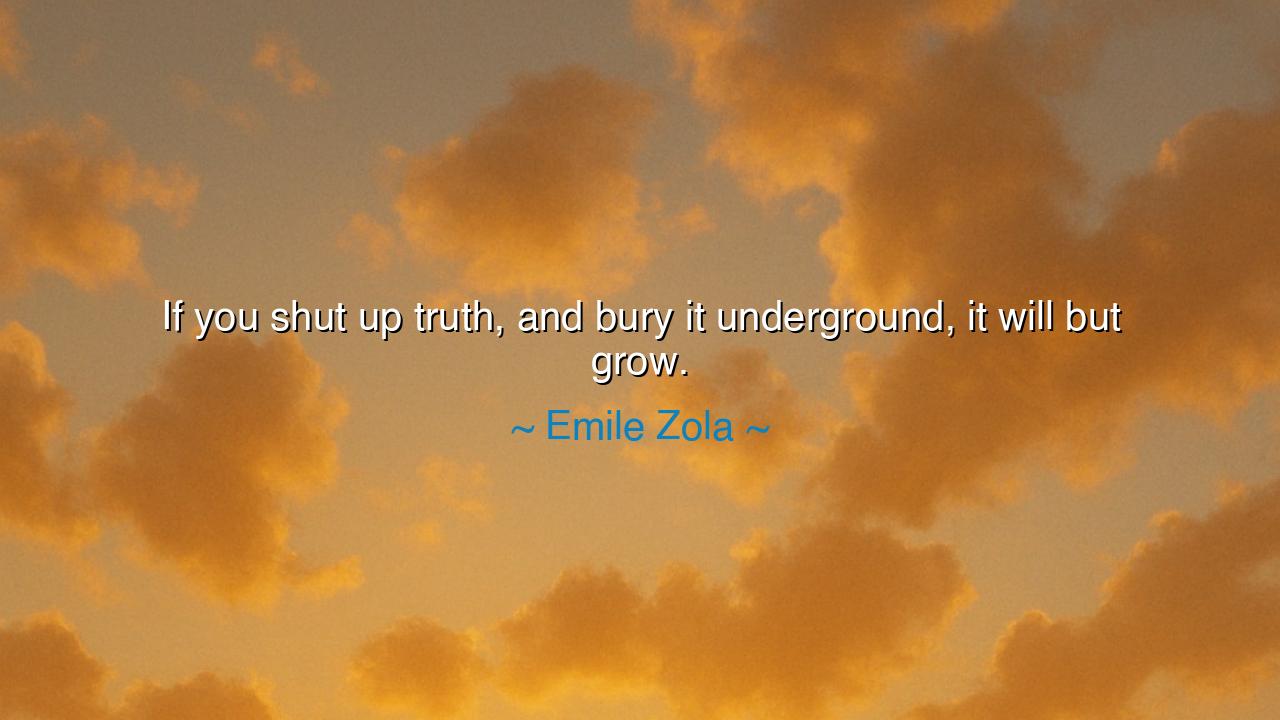
If you shut up truth, and bury it underground, it will but grow.






"If you shut up truth, and bury it underground, it will but grow." Thus spoke Émile Zola, a prophet of courage in an age of corruption. His words thunder across the centuries, reminding us that truth is a living thing, not a fragile whisper. It cannot be smothered forever beneath lies, nor entombed by fear. Like a seed planted deep in the soil, it may lie unseen for a season, but in time it bursts forth, stronger, taller, and more radiant than before. The effort to silence truth does not kill it; it only makes its voice more inevitable.
The origin of this saying rises from Zola’s own life. In the Dreyfus Affair, when injustice and deceit coiled around France like a serpent, Zola stood forth and cried “J’Accuse!” against the mighty and the corrupt. They sought to silence him, to banish him, to bury his words in shame and exile. Yet his truth took root in the hearts of people. What was meant to be suppressed grew instead into a movement that shook the foundations of power, until justice at last was forced to emerge. His words proved the very law he declared: truth grows stronger in darkness, for it hungers for the light.
History offers countless other testimonies. Think of the early Christians, persecuted and driven underground, their faith condemned as heresy. Rome sought to silence them with prisons and lions, yet the more they were buried in catacombs and blood-soaked arenas, the more their truth grew. From those hidden places, their message spread across the world, outlasting the empire that sought to erase it. For truth, once planted, becomes a root system unstoppable by force.
So too with the tale of Galileo, who was forced to recant before the Inquisition, to bury his discovery that the earth moved around the sun. They thought the truth buried beneath fear and silence. Yet it lived, it grew, until it reshaped not only science but the human vision of the universe. For though men may try to cover it with the soil of oppression, truth has a life of its own. It is as fire beneath the earth: the longer it is hidden, the greater the eruption when it breaks free.
The lesson is stern and mighty: do not fear when truth is buried, nor despair when lies seem to triumph. Lies are temporary; truth is eternal. Lies are brittle shells; truth is the seed that breaks them apart. When you stand for truth and are silenced, know that your silence is not the end but the beginning of growth. And when you witness others hiding truth, beware—what they bury today will rise tomorrow with a force too great to contain.
Practically, this means we must be guardians of patience as well as courage. Speak truth when you can, but if it is forced into silence, trust that it will find its hour. Plant it in writing, in memory, in action—so that even if suppressed, it will take root in hidden soil. Support those who suffer for speaking truth, for they are sowers of the harvest to come.
So, children of tomorrow, remember Zola’s wisdom: truth cannot be entombed. To bury it is to nourish it, to silence it is to amplify it, to deny it is to ensure its eventual triumph. Therefore, do not fear the darkness, nor the weight of the earth upon truth’s shoulders. For in time, the stone will be rolled away, and the seed will split the soil, rising into light unquenchable, eternal, and free.






HTNguyen Thi Hoai Thuong
Zola's words really resonate with me because they seem to suggest that truth has an undeniable power. Can we ever truly control truth, or is it more of a force we must eventually reckon with? I wonder if our attempts to bury the truth are actually what make it more potent and inevitable, like a pressure building up until it explodes into the open.
DDoanthihue
This quote makes me question the concept of truth itself. If truth is something that grows despite being buried, does that mean it has its own force or energy? Perhaps truth is like a seed, ready to sprout no matter how much we try to suppress it. What is it about the human condition that prevents us from accepting the truth when we know it will eventually surface?
NVThanh nguyen van
I find it fascinating how Zola captures the idea that truth can’t be silenced. It seems that the more we try to repress something, the more power it gains over time. Is this true for all truths, or only those that are universally significant? Can certain truths ever truly be buried, or does every repressed truth eventually have a reckoning?
QAQuen Anh
This quote makes me think about how often truth is suppressed or ignored in society. What happens when we try to hide the truth? Is it really possible to bury it forever, or does it just grow stronger in the background, waiting for the right moment to resurface? I wonder if the truth always has a way of finding its way out, no matter how much we try to silence it.